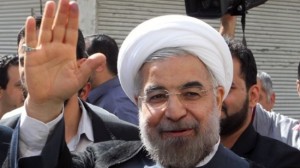 (Reuters) - Iranian President-elect Hassan Rouhani pledged to cooperate closely with parliament and to limit infighting between the legislative and executive branches, saying Iran's problems could not otherwise be�solved.
(Reuters) - Iranian President-elect Hassan Rouhani pledged to cooperate closely with parliament and to limit infighting between the legislative and executive branches, saying Iran's problems could not otherwise be�solved.Rouhani, a relative moderate who won a landslide victory over more conservative rivals in a June 14 poll, needs the backing of lawmakers to pass a budget and to deliver on promises of an increase in the minimum wage and banking sector reforms.
"The future government will not think of confrontation with parliament, nor will it think of, God forbid, fooling parliament with inaccurate statistics," Rouhani told deputies in a speech late on Sunday, according to the Mehr news agency.
"Certainly solving the country's problems will not be possible without cooperation between parliament and the executive branch," said Rouhani, who faces a tough challenge rebuilding an�economy�battered by international sanctions.
The second term of Iran's outgoing president, Mahmoud Ahmadinejad, was marked by extensive feuding with parliament, which reached a peak in February when Ahmadinejad accused the family of speaker Ali Larijani of corruption.
Lawmakers have also harshly criticized Ahmadinejad for his administration's implementation of subsidy reforms, which they say has stoked inflation.
Rouhani, a mid-ranking Shi'ite Muslim cleric who has a close relationship with theocratic Supreme Leader Ayatollah Ali Khamenei, takes office next month.
Parliament must also approve Rouhani's nominations for cabinet positions and these have been the subject of widespread speculation in the Iranian media in recent weeks.
ECONOMIC CHALLENGES
International sanctions levied over Iran's disputed nuclear program have placed enormous pressure on the country's�economy, contributing to inflation of above 30 percent, rising unemployment and a weakening of the Iranian rial.
"The country faces very difficult conditions, and some of these complexities are the result of domestic performance and some are the result of unjust foreign pressures," Rouhani told the lawmakers, referring to the sanctions.
"This is the first time that the country faces very high inflation - the highest in the region and perhaps in the world - coupled with negative economic growth."
Analysts say Rouhani, a political insider who has held high posts within the Islamic Republic for decades, has a good chance of advancing his agenda due to his ability to build bridges within Iran's factionalized politics.
But Khamenei will retain the final say on policies that most concern world powers, including Iran's nuclear program and its support for Syrian President Bashar al-Assad against rebels trying to overthrow him.
A fresh instance of Iranian political infighting broke out into the open last week.
Conservative legislator Ali Motahari, a critic of Ahmadinejad, said he had discovered eavesdropping devices installed in his office, according to the Mehr news agency.
Motahari requested the Intelligence Ministry to explain the installation of the devices, which he said violated Iranian law, while other parliament members criticized Motahari for publicizing the issue.
By Reuters
The Iran Project is not responsible for the content of quoted articles.










